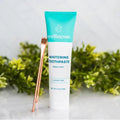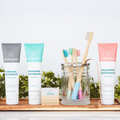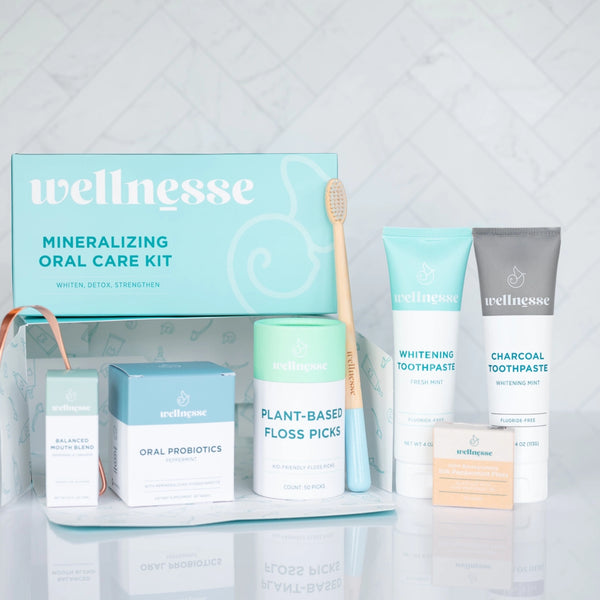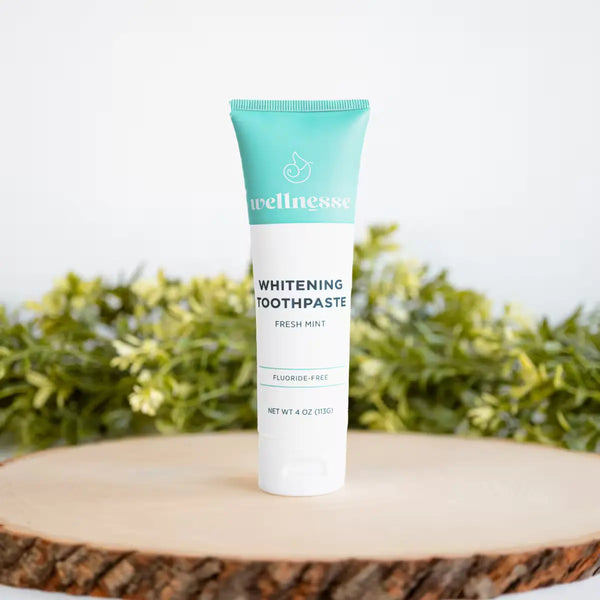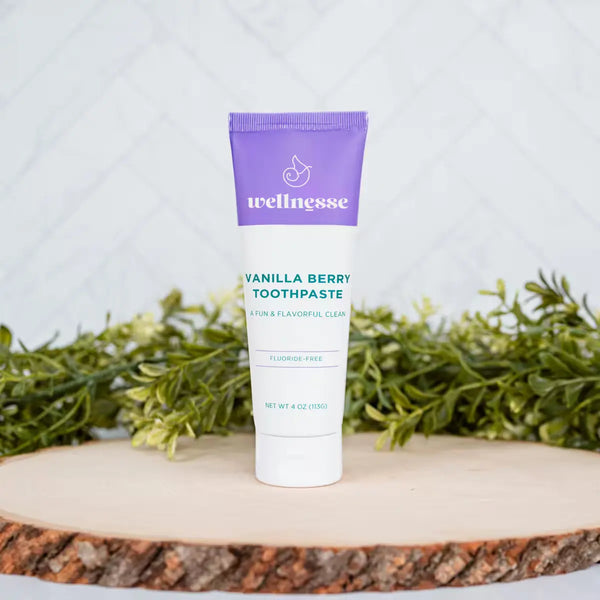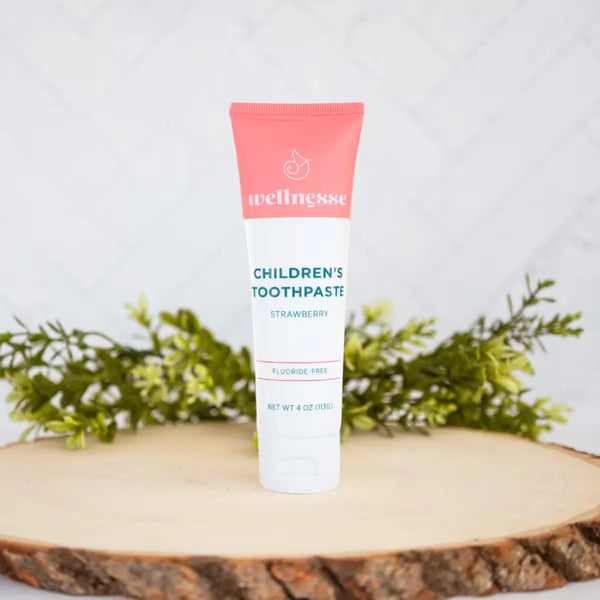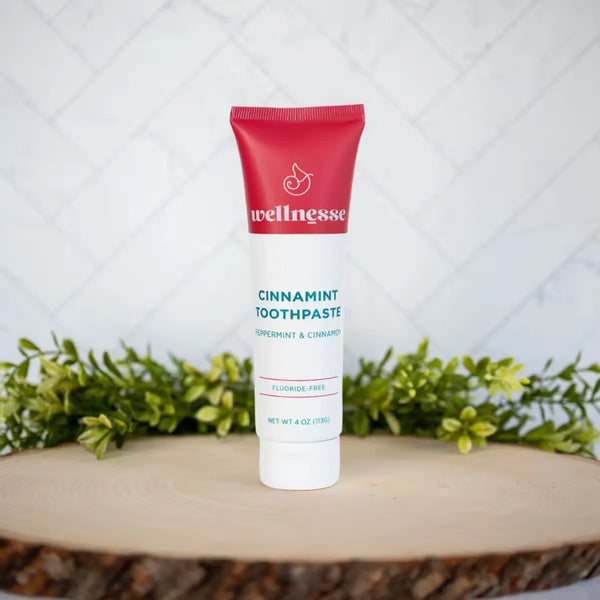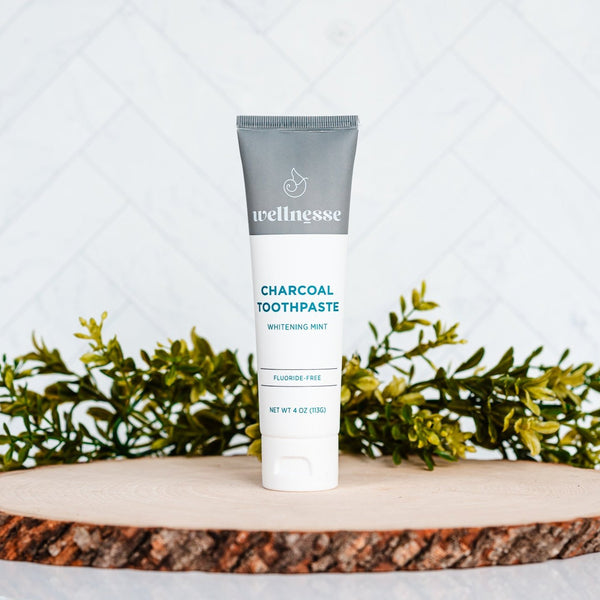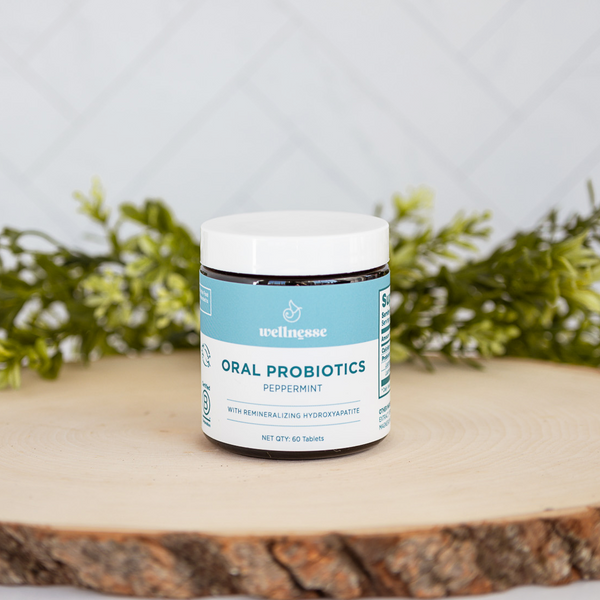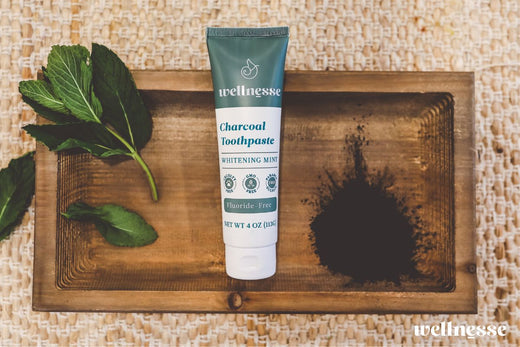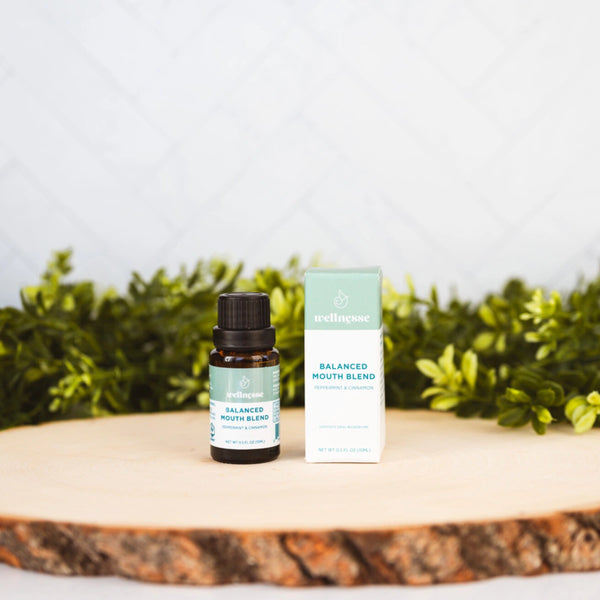Charcoal toothpaste has gained popularity over the past several years. Now, you can find it in everything from beauty blogs to social media posts to the toothpaste aisle of your favorite store.
At first glance, you might be caught off guard when you see images of people brushing their teeth with black toothpaste. Using something so dark on your pearly whites may seem counterintuitive, but there are multiple benefits to brushing your teeth with a trusted brand of charcoal toothpaste.
To better understand where we’re coming from, it’s worth diving into the history and research behind this popular ingredient.
Take advantage of all the whitening, detoxifying benefits of activated charcoal with our fluoride-free Charcoal Toothpaste!
What Is Activated Charcoal?
If you’re eyeing the bag of charcoal by your grill and thinking you’d never put it anywhere near your mouth, don’t worry. Activated charcoal is very different from the charcoal we use for cooking.
According to the National Capital Poison Center, activated charcoal is made by burning carbon-rich materials (such as coconut shells, wood, or sugar) at very high temperatures. The resulting charcoal is then ‘activated’ by exposing it to an oxidizing gas.
The process creates a fine black powder that is extremely porous. This gives it a huge surface area. This large surface area makes activated charcoal effective in removing toxins and poisons from our systems. It binds to dangerous substances, preventing them from being absorbed by our guts. This lets our bodies eliminate the toxins before they can cause harm.
As a result, this powerful substance has been used in hospitals for over two centuries to combat poisoning and remove toxins.
What Is Activated Charcoal Used For?
As we’ve seen, one of the best-established uses for activated charcoal is removing drugs and toxins from our bodies.
Doctors have used activated charcoal to treat poisoning and drug overdoses since the early 1800s. In 1811, a French chemist called Michel Bertrand gave a dramatic demonstration of its effectiveness by consuming arsenic and charcoal at the same time. The results? The charcoal helped him avoid harm from the poisonous arsenic by absorbing and removing it from his system.
Since then, plenty of research has shown that activated charcoal is a safe and effective defense against many toxic substances.
While most of us won’t need to take activated charcoal in an emergency, it has other uses and benefits that are of interest on a more regular basis.
1. Removing Toxins From Water
Sadly, drinking water isn’t always as safe as we’d like to believe. Research has found that our tap water is often contaminated with dangerous chemicals, fluorinated substances (PFAS), and heavy metals like lead and arsenic.
Charcoal filtration systems have become popular for removing these harmful components from our drinking water. These toxic substances can build up in our bodies and cause countless health issues, from hormone disruption to neurological damage.
According to the Environmental Working Group (EWG), activated carbon filters are one of the most effective systems for removing toxins from our drinking water.
2. Combatting Bad Breath
The porous nature of activated charcoal is good for absorbing more than just toxins. There’s evidence that it also helps to reduce unpleasant odors by binding the small compounds that cause the smell.
Although this effect hasn’t yet been widely studied, there has been some research into people suffering from trimethylaminuria, a condition that causes particularly strong bad breath and body odor. A 2011 study reported that treating the condition orally with activated charcoal caused this odor to decrease noticeably.
While the study was small, it is undeniable that activated charcoal binds to and removes toxins (once the charcoal itself is expelled). We also know that harmful bacteria and toxins in the mouth are the primary sources of tooth decay and bad breath. So, it makes sense that using activated charcoal in the mouth can be beneficial to overall oral health!
3. Beauty and Personal Care
With its ability to remove toxins, it is no wonder that activated charcoal is found in everything from face masks to cleansing soaps.
Again, the idea of putting something so dark on your skin can be alarming. However, charcoal washes off easily, and its abrasive properties also make it a good option for exfoliating your skin.
After its cosmetic benefits, charcoal’s ability to absorb odor means it is becoming more common as an ingredient in natural deodorants. Look for products that use charcoal made from coconut shells or wood, as these are the safer, more environmentally-friendly sources!
Charcoal In Dental Care
The idea that activated charcoal might also be effective for dental care is not new, as charcoal has been used as a natural toothpaste for thousands of years.
The ancient Greeks and Romans both used charcoal to clean their teeth, making use of its stain-fighting abrasive properties. Even much later, as commercial toothpaste began to emerge in the late 1800s and early 1900s, charcoal remained a common ingredient.
Charcoal’s popularity for cleaning teeth diminished during the 20th century as clever marketing tactics - and a preference for laboratory-made ingredients - took over. But it is now seeing a resurgence as many of us realize that conventional toothpaste ingredients might not be as good for us as we had hoped.
Natural Teeth Whitening?
One of the reasons this historic dental care ingredient is returning to popularity is that it is thought to help whiten teeth naturally.
Research published in the Journal of Applied Oral Science in 2019 found that charcoal toothpaste, when used continuously, was effective in whitening teeth. Similarly, a 2020 study looked at the effect of charcoal toothpaste on human teeth (as opposed to the cows’ teeth used in many studies). The researchers found that charcoal toothpaste did have a whitening effect on surface stains.
While conventional whitening toothpastes claim to be more effective, they also contain harmful chemicals that negatively impact our oral health. You can learn more about the toxic ingredients lurking in many oral hygiene products in our blog post here.
None of us want to use products that threaten our health, and you should never have to. That’s why we developed an alternative.
Our Activated Charcoal
We created Wellnesse to provide our family and yours with safe, effective personal care products. We started with our remineralizing Whitening Toothpaste. Powerful ingredients like green tea, neem oil, and hydroxyapatite quickly made it a household favorite.
Still, we are always looking for opportunities to improve and better meet your needs. Activated charcoal has taken the natural health industry by storm in the last few years and has been incorporated into countless health and beauty products, but not always in the best way. Most charcoal products contain harmful chemicals and synthetic additives that hurt your health more than they help. Our goal was to find a way to harness the power of this ‘new’ ingredient without compromising the integrity of the products you know and love.
Enter Wellnesse Charcoal Toothpaste. This groundbreaking charcoal-based formula boasts many of the same powerhouse ingredients as our original toothpaste but with an extra detoxifying boost! Our activated charcoal is sourced responsibly from burned coconut shells and binds to the toxins in the mouth to give you a truly deep clean (without any dirty ingredients). To top it off, it pairs perfectly with our Whitening Toothpaste, making for the ultimate oral care duo. You won’t want to miss it. Shop now!
Resources
ScienceLine, The gray area of charcoal toothpaste
The National Capital Poison Center, Activated Charcoal: An Effective Treatment for Poisonings
Juurlink D. N. (2016). Activated charcoal for acute overdose: a reappraisal. British journal of clinical pharmacology, 81(3), 482–487. https://doi.org/10.1111/bcp.12793
Ferner R. E. (2001). Our poisoned patients. QJM : monthly journal of the Association of Physicians, 94(3), 117–120. https://doi.org/10.1093/qjmed/94.3.117
Andrews, D. Q., & Naidenko, O. V. (2020). Population-Wide Exposure to Per-and Polyfluoroalkyl Substances from Drinking Water in the United States. Environmental Science & Technology Letters, 7(12), 931-936. https://doi.org/10.1021/acs.estlett.0c00713
The Guardian, We sampled tap water across the US – and found arsenic, lead and toxic chemicals
The Environmental Working Group, Removing Toxic Fluorinated Chemicals From Your Home’s Tap Water
Mackay, R. J., McEntyre, C. J., Henderson, C., Lever, M., & George, P. M. (2011). Trimethylaminuria: causes and diagnosis of a socially distressing condition. The Clinical biochemist. Reviews, 32(1), 33–43.
Palandi, S., Kury, M., Picolo, M., Coelho, C., & Cavalli, V. (2020). Effects of activated charcoal powder combined with toothpastes on enamel color change and surface properties. Journal of esthetic and restorative dentistry : official publication of the American Academy of Esthetic Dentistry ... [et al.], 32(8), 783–790. https://doi.org/10.1111/jerd.12646
Vaz, V., Jubilato, D. P., Oliveira, M., Bortolatto, J. F., Floros, M. C., Dantas, A., & Oliveira Junior, O. B. (2019). Whitening toothpaste containing activated charcoal, blue covarine, hydrogen peroxide or microbeads: which one is the most effective?. Journal of applied oral science : revista FOB, 27, e20180051. https://doi.org/10.1590/1678-7757-2018-0051
